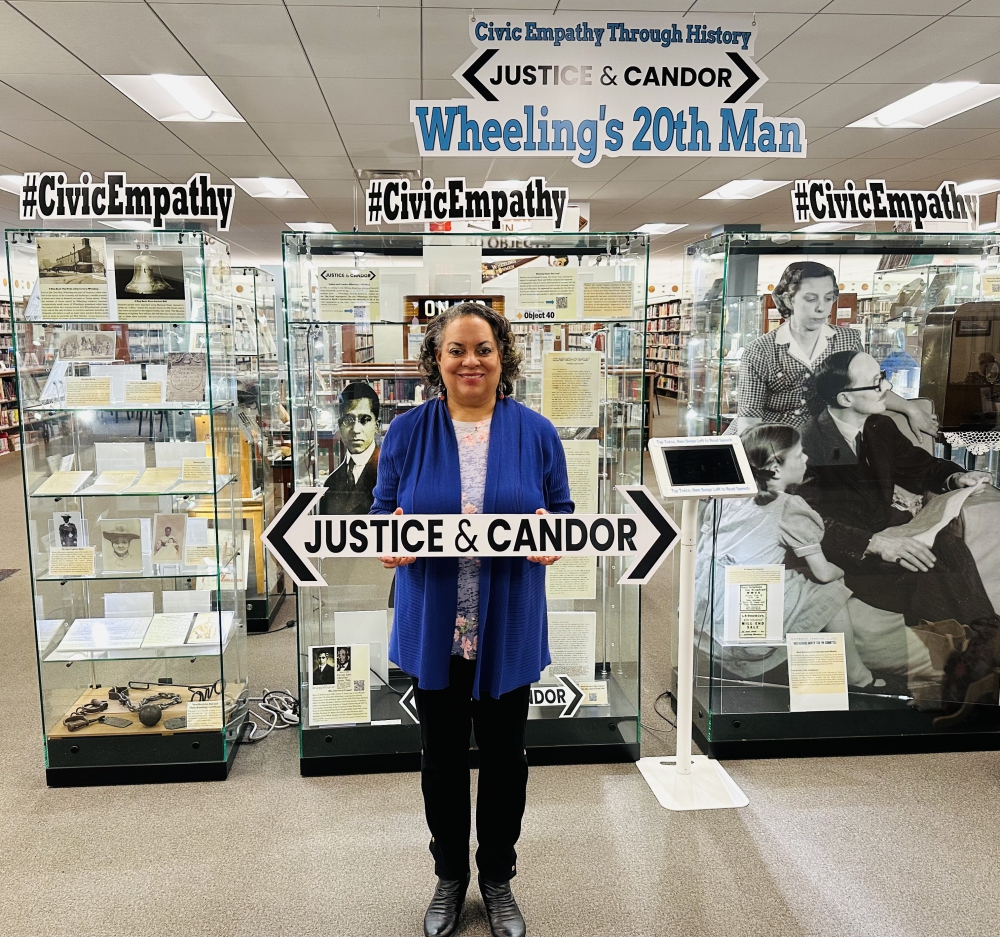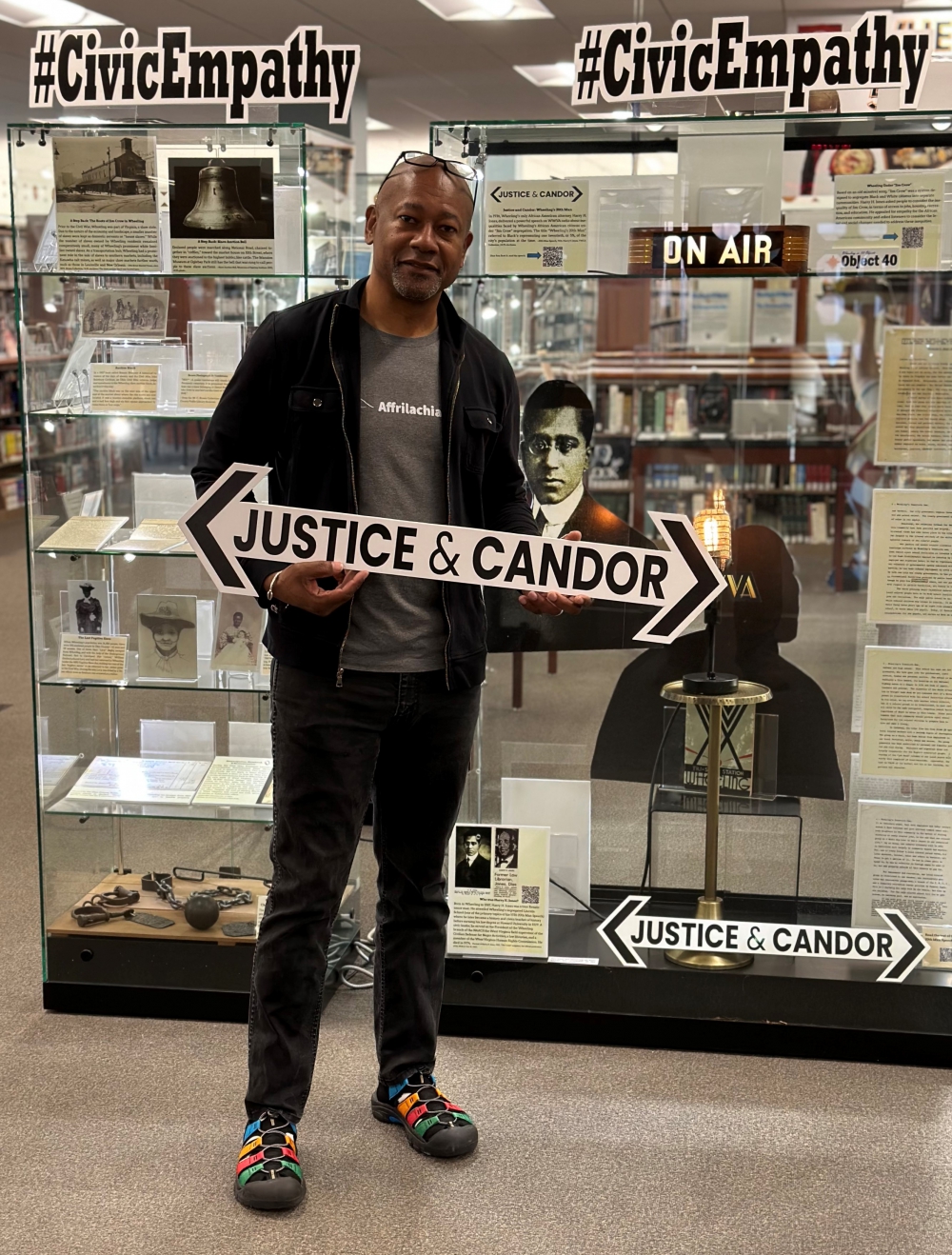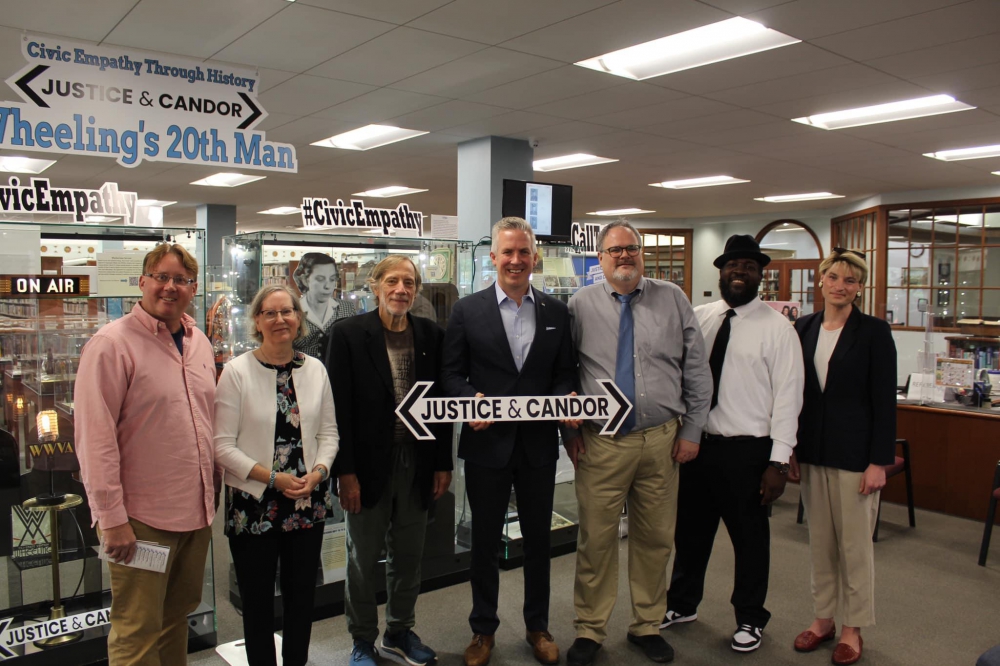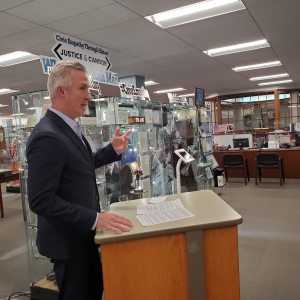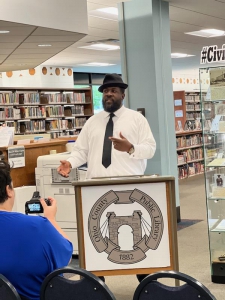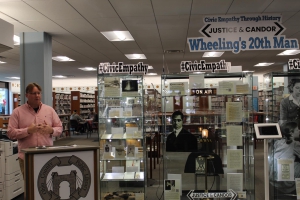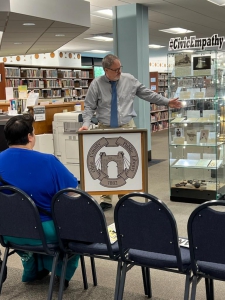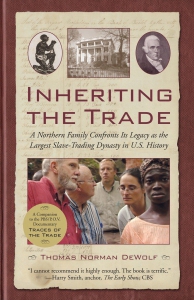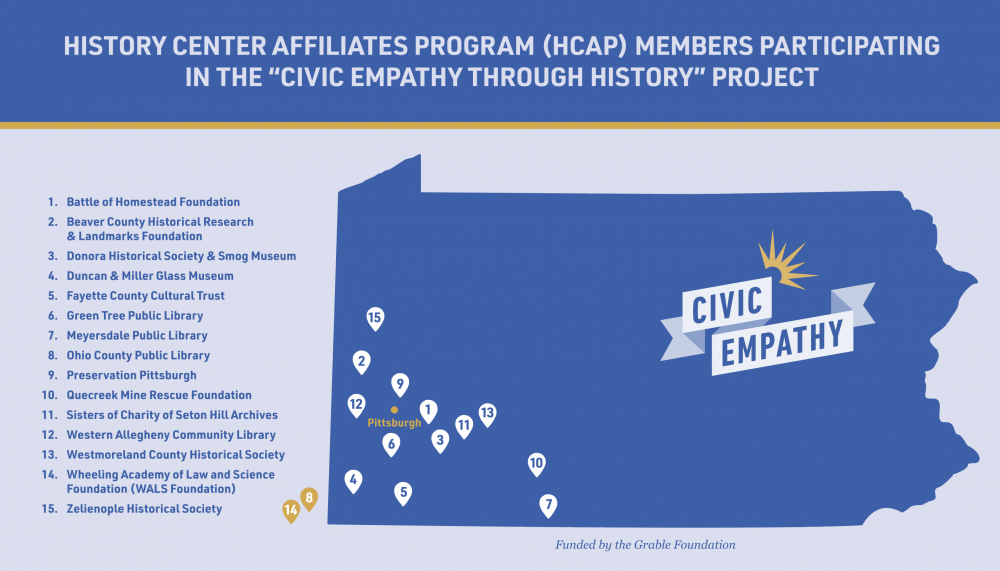
The Civic Empathy Through History Project
An Exhibit for the Ages...
#CivicEmpathyProject, #Justice&Candor
Above: Michelle Duster, great-granddaughter of Ida B. Wells, visited our exhibit on Feb. 21, 2023. Right: Frank X Walker, founding member, Affrilachian Poets, visits the exhibit on April 11, 2023.
The Civic Empathy Through History- Wheeling's 20th Man exhibit was officially opened on Sept. 27, 2022 at an 11 am event. L to R: Bob Stakeley (Heinz History Center); Jimmie McCamic (OCPL Board Chair); Tom Dewolf (Coming to the Table); Glenn Elliott (Wheeling Mayor); Sean Duffy (OCPL Exhibits); Ron Scott (YWCA); Rosemary Ketchum (Wheeling City Council).
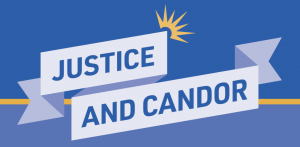 As a member of the Heinz History Center Affiliates (HCAP) program, the Ohio County Public Library had the honor of representing our region by partnering with the Heinz Center for the “Civic Empathy Through History” project, which brought together a network of 15 sites throughout our region that created engaging experiences to build empathy and serve as the foundation for civic engagement. A part of the Grable Foundation’s Tomorrow Grants program, the project highlighted stories and artifacts across Affiliate sites that showed how people have taken action to make positive impacts on their communities.
As a member of the Heinz History Center Affiliates (HCAP) program, the Ohio County Public Library had the honor of representing our region by partnering with the Heinz Center for the “Civic Empathy Through History” project, which brought together a network of 15 sites throughout our region that created engaging experiences to build empathy and serve as the foundation for civic engagement. A part of the Grable Foundation’s Tomorrow Grants program, the project highlighted stories and artifacts across Affiliate sites that showed how people have taken action to make positive impacts on their communities.
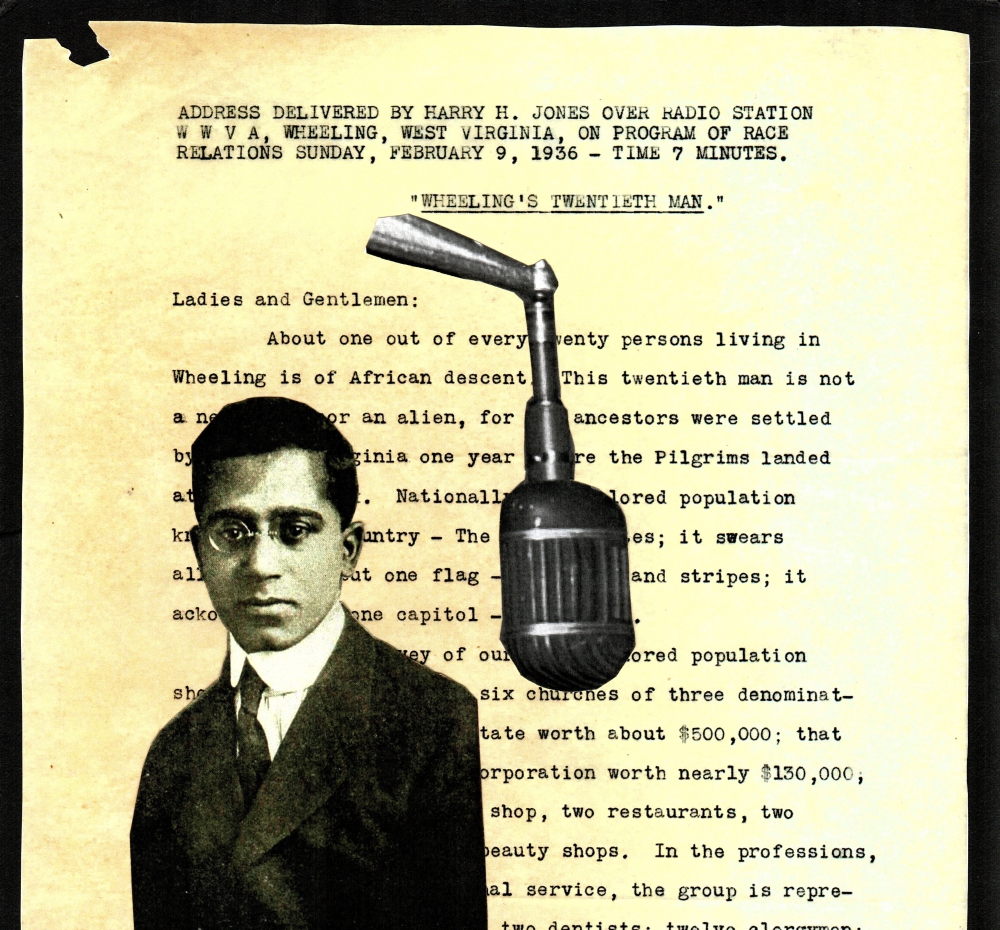 Our Artifact
Our Artifact
The Library's featured artifact was a typewritten speech from the YWCA Blue Triangle Collection. On February 9, 1936, Harry H. Jones, Wheeling’s only African American attorney at the time, delivered a talk on the city’s white-owned radio station WWVA. Titled “Wheeling’s 20th Man,” it referred to Black’s representing one twentieth, or 5%, of the city’s population at the time. The speech centered on the conditions faced by Wheeling’s African American citizens under “Jim Crow,” a system designed to segregate Black and White citizens into separate communities. In a courageous challenge to the Wheeling community, Jones asked people to consider the inequality of Jim Crow, in terms of access to jobs, housing, recreation, and education. He appealed for empathy for the African American community and asked listeners to consider the legal and social changes needed to address these inequities.
Hear the speech read by Ron Scott.
Click to watch a video created by Wheeling Central High School students after visiting the exhibit.
Click to hear about the project on WV Public Broadcasting.
Since landmark legal cases such as 1954’s Brown v. Board of Education ended racial segregation, Wheeling has struggled with integration. The Brown decision effectively closed Lincoln, Wheeling’s underfunded African American school. The city practiced “redlining,” granting suburban housing loans to white families while pushing Blacks to urban housing even as “urban renewal” decimated existing Black communities.
Like most of the rest of the country, Civil Rights protests in Wheeling were met with police pushback, but African American leaders persevered.
As one consequence of these struggles to overcome a segregated history, the town has suffered from the exodus of younger African Americans who have often left seeking greater economic and social opportunities. Many of those who have stayed have worked to improve Wheeling’s diversity and community harmony by advocating for economic and social justice. Some have founded minority owned businesses. These entrepreneurs face the same challenges of all small businesspeople, but also wrestle with the obstacles remaining from Jim Crow.
 Harry H. Jones’s “Wheeling’s 20th Man” speech was delivered on WWVA radio, February 9, 1936. While speaking directly to the people of Wheeling, Jones advised “Justice and candor require attention to the handicaps suffered by Wheeling’s twentieth man.” He went on to describe an entirely separate Black community, with its own doctors, dentists, restauranteurs, shop keepers, hairdressers, and even funeral directors. Wheeling in 1936 was actually two cities, side-by-side but completely separate. This constituted Wheeling under Jim Crow: separate, and decidedly not equal.
Harry H. Jones’s “Wheeling’s 20th Man” speech was delivered on WWVA radio, February 9, 1936. While speaking directly to the people of Wheeling, Jones advised “Justice and candor require attention to the handicaps suffered by Wheeling’s twentieth man.” He went on to describe an entirely separate Black community, with its own doctors, dentists, restauranteurs, shop keepers, hairdressers, and even funeral directors. Wheeling in 1936 was actually two cities, side-by-side but completely separate. This constituted Wheeling under Jim Crow: separate, and decidedly not equal.
Wheeling’s past still impacts the present. The phrase “justice and candor” from the “20th Man” speech is still relevant for us. We want to hear from you.
View the Exhibit Virtually
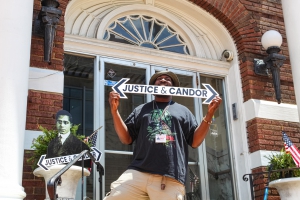 We asked Ron Scott to rewrite the Jones speech from a 2022 perspective. Read Ron's modern take, “Acceptance, Understanding, & Opportunity. The 20th Man That Stands Before You."
We asked Ron Scott to rewrite the Jones speech from a 2022 perspective. Read Ron's modern take, “Acceptance, Understanding, & Opportunity. The 20th Man That Stands Before You."
Listen to Ron's reading of his rewrite HERE.
Call to Action
JUSTICE CREATES OPPORTUNITIES FOR ALL TO THRIVE:
This brochure lists and locates locally owned businesses. Consider visiting and supporting them, particularly minority, women, or LGBTQ owned enterprises. MMake a purchase. Distribute flyers. Post about these businesses on social media using #Justice&Candor. These actions all constitute support.
Download the Brochure
CANDOR CREATES EMPATHY:
Consider speaking or reflecting candidly, openly, and honestly, on this issue. Fill out a form or record a video sharing your experience visiting the exhibit. What feelings did it evoke? Do you have a personal story of overcoming obstacles? What more can be done in the name of Justice and Candor?
After you view the exhibit, fill out our CALL TO ACTION FORM.
#CivicEmpathyProject
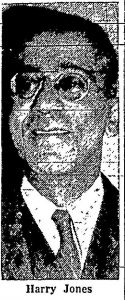 Harry H. Jones wrote a column titled, "Along the Color Line," which ran in the Wheeling Sunday News-Register from Feb. 1946 to Jan. 1948.
Harry H. Jones wrote a column titled, "Along the Color Line," which ran in the Wheeling Sunday News-Register from Feb. 1946 to Jan. 1948.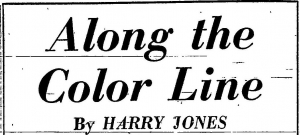
Read the Column
Civic Empathy Through History Programs
September 27, 2022 - 11:00am - CIVIC EMPATHY THROUGH HISTORY: Opening of New Exhibit and Project in Partnership with Heinz History Center
The exhibit is now officially open!
September 27, 2022 - Noon - LUNCH WITH BOOKS: Civic Empathy Through History: Coming to the Table with Tom DeWolf & Ron Scott
Watch the Program on YouTube
September 27, 2022 - 6:00pm - TRACES OF TRADE: Film Screening & Q&A with Tom DeWolf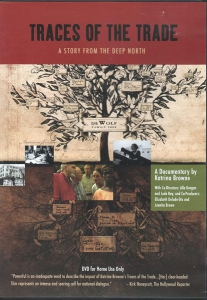
Watch the Film on Kanopy
Jan. 17, 2023 at Lunch With Books: Reliving the Pythian with Daryl Clausell
Feb. 14, 2023 Paul Robeson, Renaissance Man: A Chautauqua, with Marvin Jefferson
Feb. 21, 2023 Ann Thomas Memorial Lecture featuring Michelle Duster (Also Dedicated to Ms. Eileen Miller)
Feb. 28, 2023 Remembering Blessed Martin School
“CIVIC EMPATHY THROUGH HISTORY” Sites:
1. Battle of Homestead Foundation, P.O. Box 339, Homestead, PA 15120
2. Beaver County Historical Research & Landmarks Foundation, 1235 3rd Ave, Freedom, PA 15042
3. Donora Historical Society and Smog Museum, 595 McKean Ave, Donora, PA 15033
4. Duncan & Miller Glass Museum, 100 Ridge Ave, Washington, PA 15301
5. Fayette County Cultural Trust - Connellsville Canteen, 139 West Crawford Avenue, Connellsville PA 15425
6. Green Tree Public Library, 10 W Manilla Ave, Pittsburgh, PA 15220
7. Meyersdale Public Library, 210 Center St, Meyersdale, PA 15552
8. Ohio County Public Library, 52-16th Street, Wheeling, WV 26003
9. Preservation Pittsburgh, 1501 Reedsdale St #5003, Pittsburgh, PA 15233
10. Quecreek Mine Rescue Foundation, 140 Haupt Rd, Somerset, PA 15501
11. Sisters of Charity of Seton Hill Archive, 129 DePaul Center Rd., Greensburg, PA 15601
12. Western Allegheny Community Library, 181 Bateman Rd, Oakdale, PA 15071
13. Westmoreland County Historical Society, 809 Forbes Trail Rd, Greensburg, PA 15601
14. Wheeling Academy-Law & Science (WALS) Foundation, 1413 Eoff St., Wheeling, WV 26003
15. Zelienople Historical Society, 243 S Main St, Zelienople, PA 16063
All exhibit summaries can be viewed HERE.









